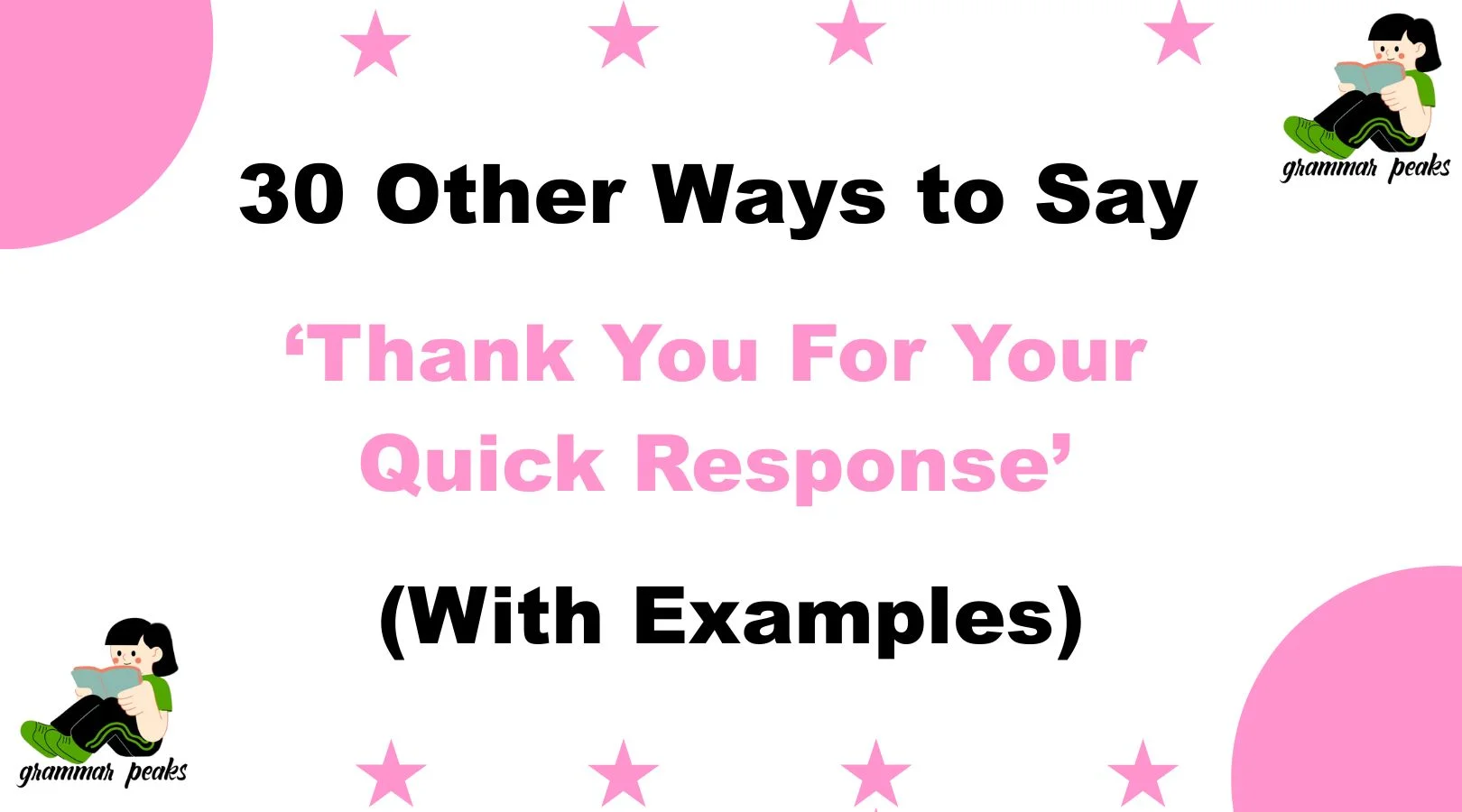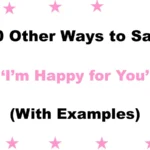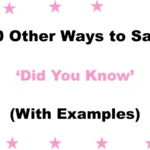Expressing gratitude is a powerful way to build connections and show appreciation. When someone replies promptly, recognising their quick response can make your communication feel warm and sincere. Using different phrases to say “Thank you for your quick response” helps keep your messages fresh, thoughtful, and personal. Whether in professional emails, casual chats, or customer service interactions, finding the right words can strengthen relationships and convey genuine appreciation.
Below, you’ll find 30 alternative ways to express your thanks, each with explanations, examples, and guidance on the best context to use them. This article aims to help you communicate with care and clarity, ensuring your gratitude resonates every time.
What Does “Thank You For Your Quick Response” Mean?
“Thank you for your quick response” is a polite and appreciative phrase used to acknowledge and express gratitude for someone replying promptly to a message, request, or inquiry. It conveys that you not only received their response but also genuinely value the speed and efficiency with which they replied.
When to Use “Thank You For Your Quick Response”
- When time is of the essence and a prompt reply helps move things forward.
- After receiving urgent information or decisions quickly.
- To acknowledge and encourage responsiveness in professional communication.
- When you want to maintain a positive tone in ongoing email conversations.
- To show respect and gratitude in customer service exchanges.
Is It Professional/Polite to Say “Thank You For Your Quick Response”?
Yes, it is both professional and polite to say this phrase. It shows respect for the other person’s effort and time, encourages efficient communication, and fosters goodwill. Using variations can also make your message feel more natural and less repetitive, which is ideal in professional writing.
Pros and Cons of Saying “Thank You For Your Quick Response”
Pros:
- Encourages timely replies in the future.
- Builds rapport and goodwill.
- Shows attentiveness and appreciation.
Cons:
- Can sound robotic if overused.
- Might seem insincere if the response wasn’t truly quick.
- May feel redundant in fast-paced, informal communication.
Synonyms for “Thank You For Your Quick Response”
- Thanks for getting back to me so swiftly
- I appreciate your prompt reply
- Thank you for your timely response
- Grateful for your quick turnaround
- Thanks for your speedy feedback
- I’m thankful for your rapid reply
- Thanks for responding so fast
- I appreciate your immediate attention
- Thank you for your fast response
- Thanks for your quick follow-up
- Grateful for your swift reaction
- Thank you for your rapid feedback
- Appreciate your quick communication
- Thanks for your prompt attention
- Thank you for your fast reply
- I’m grateful for your quick answer
- Thanks for your speedy response
- Thank you for your immediate reply
- I appreciate your quick turnaround time
- Thanks for getting back to me promptly
- Grateful for your efficient response
- Thanks for your quick acknowledgment
- Thank you for your timely follow-up
- I appreciate your swift reply
- Thanks for your rapid communication
- Thank you for your quick feedback
- Grateful for your prompt reply
- Thanks for your fast attention to this
- I appreciate your immediate response
- Thank you for your quick engagement
1. Thanks for getting back to me so swiftly
Definition: Expressing thanks for a fast reply using a conversational tone.
Explanation: This phrase highlights both appreciation and the speed of the response in a friendly manner.
Scenario Example: After sending a project question, you receive an answer within the hour and reply with this phrase.
Best Use: Informal or semi-formal communication with colleagues or clients you know well.
Worst Use: Too casual for highly formal business emails.
Tone: Friendly, warm, and appreciative.
2. I appreciate your prompt reply
Definition: A polite expression recognizing the quickness of the reply.
Explanation: This phrase is straightforward and formal, ideal for professional settings.
Scenario Example: You email a vendor asking for delivery details, and they reply promptly.
Best Use: Business emails, professional correspondence.
Worst Use: Can feel stiff in casual conversations.
Tone: Professional, respectful, and courteous.
3. Thank you for your timely response
Definition: Expressing gratitude for a reply received at an appropriate or needed time.
Explanation: This phrase emphasizes not only speed but the importance of timing.
Scenario Example: When a deadline is tight and a colleague replies just in time to meet it.
Best Use: Formal emails, situations with time sensitivity.
Worst Use: Less effective when timing isn’t critical.
Tone: Formal, grateful, businesslike.
4. Grateful for your quick turnaround
Definition: Thanks for completing a task or reply quickly after a request.
Explanation: Often used when a response involves effort beyond just replying, like completing work.
Scenario Example: A designer sends you a revised draft quickly, and you express thanks with this phrase.
Best Use: Project collaborations, professional teamwork.
Worst Use: When only a simple reply was needed, not a full task.
Tone: Appreciative, professional, sincere.
5. Thanks for your speedy feedback
Definition: Thanking someone for quickly providing input or comments.
Explanation: Focuses on receiving evaluative or constructive responses swiftly.
Scenario Example: You send a report for review and get quick feedback from your manager.
Best Use: Work-related feedback or critique contexts.
Worst Use: When no feedback or evaluation was requested.
Tone: Professional, warm, thankful.
6. I’m thankful for your rapid reply
Definition: Expressing gratitude with a slightly formal tone for a fast response.
Explanation: Highlights appreciation with emphasis on the speed of communication.
Scenario Example: After a quick response from customer service, you use this to show gratitude.
Best Use: Formal and semi-formal communication.
Worst Use: Too formal for very casual chats.
Tone: Polite, grateful, formal.
7. Thanks for responding so fast
Definition: Informal way to thank someone for a quick reply.
Explanation: Simple and direct; best for casual or friendly interactions.
Scenario Example: Messaging a coworker via chat who quickly answers your question.
Best Use: Informal emails, chats, text messages.
Worst Use: Formal business emails.
Tone: Casual, friendly, appreciative.
8. I appreciate your immediate attention
Definition: Thanks for quickly focusing on and replying to an issue or request.
Explanation: Highlights the promptness and seriousness with which the person addressed the matter.
Scenario Example: When a client addresses a concern urgently and you acknowledge it.
Best Use: Customer service, urgent professional matters.
Worst Use: When the situation is casual or not urgent.
Tone: Professional, respectful, urgent.
9. Thank you for your fast response
Definition: Direct thanks for receiving a reply quickly.
Explanation: Clear and to the point, suitable for most contexts.
Scenario Example: After receiving a timely answer from a colleague about scheduling.
Best Use: Formal or informal communication.
Worst Use: None significant; versatile phrase.
Tone: Neutral, polite, straightforward.
10. Thanks for your quick follow-up
Definition: Appreciation for promptly following up on a previous conversation or task.
Explanation: Emphasizes continuing communication or checking back quickly.
Scenario Example: A team member quickly checks back after initial feedback.
Best Use: Professional teamwork, client follow-ups.
Worst Use: If no follow-up was expected or necessary.
Tone: Appreciative, collaborative, professional.
11. Grateful for your swift reaction
Definition: Thanks for quickly responding or acting on a message or situation.
Explanation: Indicates appreciation for both reply and action.
Scenario Example: A manager quickly adjusts plans after your request.
Best Use: Situations requiring quick decision or action.
Worst Use: When no action was involved.
Tone: Respectful, professional, grateful.
12. Thank you for your rapid feedback
Definition: Thanking someone for quickly providing input or comments.
Explanation: Similar to #5 but emphasizes speed even more.
Scenario Example: Quick critique from a mentor or supervisor.
Best Use: Formal or semi-formal reviews.
Worst Use: Informal chats without feedback requests.
Tone: Professional, formal, grateful.
13. Appreciate your quick communication
Definition: Thanks for efficient and timely sharing of information.
Explanation: Recognizes promptness and clarity in communication.
Scenario Example: A client provides requested details quickly.
Best Use: Business emails, customer relations.
Worst Use: Informal or delayed responses.
Tone: Polite, formal, appreciative.
14. Thanks for your prompt attention
Definition: Thanks for quickly focusing on an issue or request.
Explanation: Highlights urgency and responsiveness.
Scenario Example: When someone addresses a problem or question right away.
Best Use: Urgent or important matters.
Worst Use: Casual or slow situations.
Tone: Professional, respectful, appreciative.
15. Thank you for your fast reply
Definition: Simple thanks for a quick response.
Explanation: Direct and clear, suitable in many situations.
Scenario Example: After receiving a reply quickly in email.
Best Use: Most contexts, formal or informal.
Worst Use: None significant.
Tone: Neutral, polite.
16. I’m grateful for your quick answer
Definition: Thanks for providing a fast solution or reply.
Explanation: Emphasizes the speed of answering a question or request.
Scenario Example: Quick response to a technical question.
Best Use: Professional or educational contexts.
Worst Use: Casual or social chats.
Tone: Polite, appreciative.
17. Thanks for your speedy response
Definition: Thanks for a fast reply or reaction.
Explanation: Casual yet respectful phrase.
Scenario Example: Fast reply from a teammate or friend.
Best Use: Semi-formal, informal communication.
Worst Use: Too casual for formal emails.
Tone: Friendly, warm.
18. Thank you for your immediate reply
Definition: Expressing thanks for an instant or very fast response.
Explanation: Highlights the urgency and promptness.
Scenario Example: When time is critical and a reply comes instantly.
Best Use: Urgent professional matters.
Worst Use: Non-urgent contexts.
Tone: Formal, respectful.
19. I appreciate your quick turnaround time
Definition: Thanks for completing a reply or task rapidly.
Explanation: Often used when the response involved effort or work, not just answering.
Scenario Example: When a colleague returns a completed task quickly.
Best Use: Project management, teamwork.
Worst Use: Simple email replies.
Tone: Professional, appreciative.
20. Thanks for getting back to me promptly
Definition: Thanks for replying without delay.
Explanation: Polite, neutral phrase good for many situations.
Scenario Example: Email follow-up or client reply.
Best Use: Formal and informal.
Worst Use: None significant.
Tone: Polite, neutral.
21. Grateful for your efficient response
Definition: Thanks for a reply that was both quick and well-handled.
Explanation: Recognizes quality along with speed.
Scenario Example: Customer service quickly solving a problem.
Best Use: Professional, service-oriented.
Worst Use: Casual chats.
Tone: Professional, appreciative.
22. Thanks for your quick acknowledgment
Definition: Thanks for promptly confirming receipt or understanding.
Explanation: Focuses on timely recognition rather than full response.
Scenario Example: When someone quickly confirms they received your message.
Best Use: Formal, professional.
Worst Use: Informal or chatty contexts.
Tone: Polite, professional.
23. Thank you for your timely follow-up
Definition: Thanks for quickly following up on a previous communication.
Explanation: Shows appreciation for continuous and prompt engagement.
Scenario Example: A client responds to your follow-up email fast.
Best Use: Business, client relations.
Worst Use: When no follow-up was expected.
Tone: Professional, courteous.
24. I appreciate your swift reply
Definition: Thanks for a fast and efficient response.
Explanation: Simple and formal enough for business emails.
Scenario Example: Quick response from a supervisor or colleague.
Best Use: Formal or semi-formal contexts.
Worst Use: Informal chats.
Tone: Polite, professional.
25. Thanks for your rapid communication
Definition: Thanks for fast and clear sharing of information.
Explanation: Recognizes both speed and clarity.
Scenario Example: Quick sharing of vital project updates.
Best Use: Professional teamwork.
Worst Use: Casual contexts.
Tone: Formal, appreciative.
26. Thank you for your quick feedback
Definition: Thanks for quickly providing your opinions or comments.
Explanation: Emphasizes speed in evaluation or advice.
Scenario Example: Fast review from a peer or mentor.
Best Use: Formal or semi-formal professional feedback.
Worst Use: Casual chats.
Tone: Polite, professional.
27. Grateful for your prompt reply
Definition: Thanks for quickly responding.
Explanation: Straightforward and polite.
Scenario Example: Email reply to a client inquiry.
Best Use: Formal, professional.
Worst Use: Informal contexts.
Tone: Polite, respectful.
28. Thanks for your fast attention to this
Definition: Thanks for quickly focusing on a matter or request.
Explanation: Highlights urgency and importance.
Scenario Example: When someone quickly addresses an issue you raised.
Best Use: Business, urgent matters.
Worst Use: Casual situations.
Tone: Professional, urgent.
29. I appreciate your immediate response
Definition: Thanks for an instant reply.
Explanation: Emphasizes speed and promptness.
Scenario Example: Quick answer from support staff.
Best Use: Urgent professional situations.
Worst Use: Non-urgent communication.
Tone: Formal, polite.
30. Thank you for your quick engagement
Definition: Thanks for promptly getting involved or responding.
Explanation: Good for situations where participation or involvement was needed quickly.
Scenario Example: A team member quickly jumps on a discussion or task.
Best Use: Collaborative work environments.
Worst Use: Simple information replies.
Tone: Appreciative, professional.
Conclusion
Using varied expressions to say “Thank you for your quick response” allows your gratitude to feel more personal, warm, and genuine. Each alternative phrase has its unique tone and best use scenario, whether formal, casual, professional, or urgent. By choosing the right words, you strengthen relationships and show true appreciation for others’ time and effort. Remember, the best phrase is one that matches the situation, your relationship with the recipient, and the message’s tone. With this diverse list, you’re well-equipped to express your thanks thoughtfully and effectively in any communication.
FAQs
1. Why should I use alternatives to “Thank you for your quick response”?
Using alternatives helps keep your communication fresh, thoughtful, and engaging. It avoids sounding repetitive, especially in professional settings where you often exchange multiple emails. Choosing varied expressions also allows you to tailor your tone—more formal, casual, or friendly—depending on the situation.
2. Are these alternatives appropriate for formal business emails?
Yes, many of the alternatives such as “I appreciate your prompt reply,” or “Thank you for your timely response” are professional and polite, making them suitable for business emails. Always consider your relationship with the recipient and the tone of your message when choosing a phrase.
3. Can I use these phrases in customer service or client emails?
Absolutely. Many of these phrases like “Grateful for your quick turnaround” or “Thanks for your fast attention to this” are ideal for client communication, helping to show appreciation, respect, and professionalism. They also promote positive rapport with customers and clients.
4. What’s the difference between “timely response” and “quick response”?
A “quick response” emphasizes speed, while a “timely response” focuses on responding at the right or most helpful time. Both convey appreciation, but “timely” may sound more thoughtful or strategic depending on the context.
5. What tone should I aim for in professional thank-you messages?
In most cases, aim for a tone that is polite, warm, and respectful. Your message should show genuine appreciation without sounding overly formal or distant. Choosing the right phrase from this list helps you strike that balance naturally.

Mariah Cannon is a dedicated Senior Content Specialist at GrammarPeaks, known for her clear, engaging writing and deep knowledge of English grammar and usage. With a background in linguistics and years of experience in content development, Mariah crafts informative and accessible articles that empower readers to master the nuances of the English language. Her work reflects a commitment to clarity, education, and helping others express themselves with confidence.





